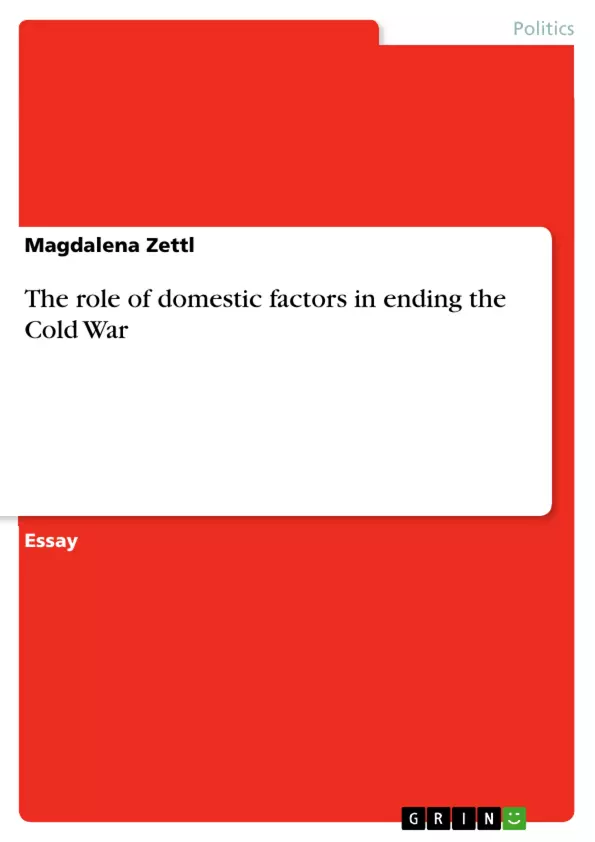The end of the Cold War left many IR scholars puzzled: how could, after 40 years, the Cold War end that peacefully? Why did Soviet foreign policy change so drastically within a few years? How come US perception of the Soviet Union (SU) changed within a decade from the "evil empire" to an allied partner? Neither realism nor liberalism could have predicted or fully explained this event. Realism failed - firstly, because rivalry between the US and the SU ended peacefully; secondly, moving from a bipolar to a unipolar system clearly contradicted realist expectations on balance of power and power equilibrium (Risse-Kappen, 1994). Instead, the end of the Cold War proved the "unbashed victory of economic and political liberalism" (Fukuyama, 1989). SU's move toward liberal order brough forward the end of the Cold War, but this does not answer why the SU chose to adopt liberal order, why to such an extent and why around the mid 1980s. Hence, domestic factors, having been excluded from the analysis so far, must have played a key role.
After a theoretical review on domestic variables in IR, I will analyze how domestic factors influenced Soviet foreign policy, especially Soviet "new thinkers", economic factors and domestic political infrastructure. To provide a complete analysis, I will also shed light on the influence of US5 domestic variables.
Inhaltsverzeichnis (Table of Contents)
- Influence of Domestic Politics in IR
- The Role of Soviet “New Thinkers”
- Economic Factors and the End of the Cold War
- Domestic Political Infrastructure in the Soviet Union
- Influence of US Domestic Factors
- Conclusion
Zielsetzung und Themenschwerpunkte (Objectives and Key Themes)
This paper analyzes the role of domestic factors in ending the Cold War. It argues that, while international relations theory, particularly realism, struggled to predict or explain the end of the Cold War, domestic factors, especially those related to the Soviet Union, played a critical role.- The impact of Soviet "new thinkers" on Soviet foreign policy
- The influence of economic factors, particularly the decline of the Soviet economy, on Soviet foreign policy
- The role of domestic political infrastructure and leadership in shaping Soviet foreign policy
- The influence of US domestic factors, including economic strength and presidential leadership, on the end of the Cold War
Zusammenfassung der Kapitel (Chapter Summaries)
- The paper begins by introducing the question of the role of domestic factors in ending the Cold War, highlighting the limitations of existing IR theories, particularly realism and liberalism, in explaining this event. It then establishes the theoretical framework by arguing for the importance of domestic variables in shaping state behavior.
- The paper then examines the influence of Soviet "new thinkers" on Soviet foreign policy, arguing that they played a crucial role in shifting Soviet foreign policy towards a more cooperative and less hostile relationship with the West.
- The chapter on economic factors explores the impact of the declining Soviet economy on Soviet foreign policy, arguing that the economic challenges faced by the Soviet Union contributed to its increasing openness to a liberal economic order and closer ties with the West.
- The chapter on domestic political infrastructure focuses on the role of Gorbachev's leadership and the broader domestic reforms, including glasnost and perestroika, in shaping Soviet foreign policy and contributing to the end of the Cold War.
- The paper concludes by exploring the influence of US domestic factors, such as reaganomics and presidential leadership, on the end of the Cold War. It argues that US economic strength and Reagan's foreign policy strategy also played a role in ending the Cold War.
Schlüsselwörter (Keywords)
The paper focuses on the end of the Cold War, domestic factors in international relations, Soviet foreign policy, Soviet "new thinkers", economic factors, domestic political infrastructure, US foreign policy, and the role of leadership.Frequently Asked Questions
Why did Realism fail to predict the end of the Cold War?
Realism failed because it couldn't explain why the bipolar rivalry ended peacefully and why the Soviet Union accepted a shift to a unipolar system, contradicting balance-of-power expectations.
What role did the Soviet "New Thinkers" play?
Soviet "New Thinkers" shifted foreign policy toward cooperation with the West, moving away from hostile ideological confrontation.
How did domestic economic factors influence Soviet policy?
The decline of the Soviet economy forced the leadership to adopt reforms and seek closer ties with the liberal economic order of the West.
What was the impact of Gorbachev's domestic reforms?
Reforms like glasnost and perestroika altered the political infrastructure, facilitating the end of the Cold War through internal transformation.
Did US domestic factors contribute to the end of the Cold War?
Yes, factors such as Reaganomics, US economic strength, and presidential leadership were instrumental in shaping the final stages of the conflict.
- Quote paper
- Magdalena Zettl (Author), 2012, The role of domestic factors in ending the Cold War, Munich, GRIN Verlag, https://www.grin.com/document/266409



